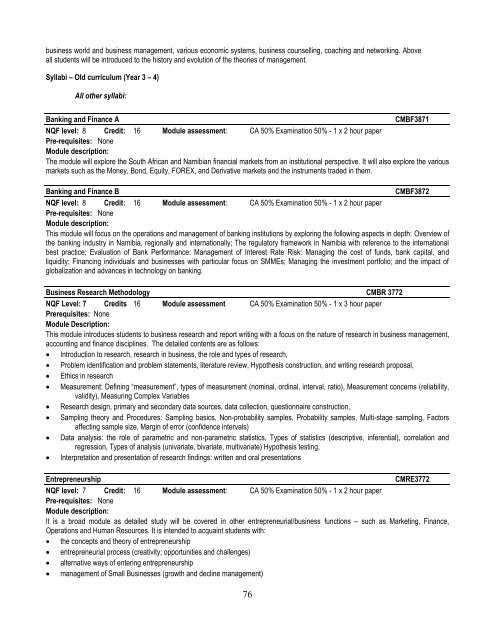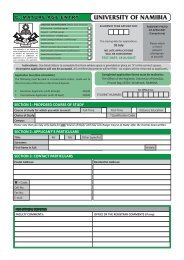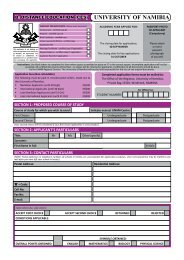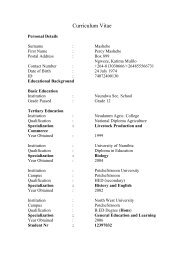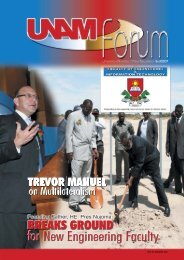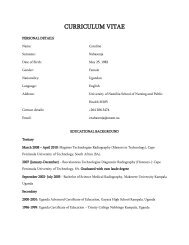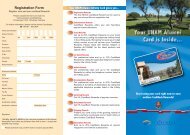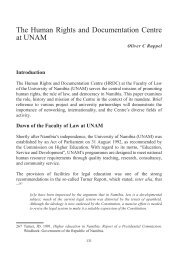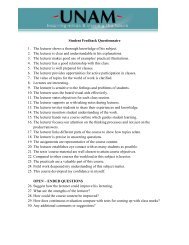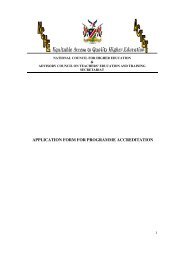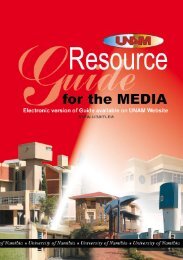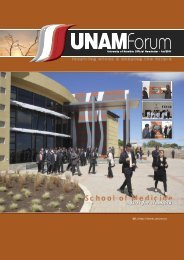usiness world and business management, various economic systems, business counselling, coaching and networking. Aboveall students will be introduced to the history and evolution of the theories of management.Syllabi – Old curriculum (Year 3 – 4)All other syllabi:Banking and Finance ACMBF3871NQF level: 8 Credit: 16 Module assessment: CA 50% Examination 50% - 1 x 2 hour paperPre-requisites: NoneModule description:The module will explore the South African and Namibian financial markets from an institutional perspective. It will also explore the variousmarkets such as the Money, Bond, Equity, <strong>FOR</strong>EX, and Derivative markets and the instruments traded in them.Banking and Finance BCMBF3872NQF level: 8 Credit: 16 Module assessment: CA 50% Examination 50% - 1 x 2 hour paperPre-requisites: NoneModule description:This module will focus on the operations and management of banking institutions by exploring the following aspects in depth: Overview ofthe banking industry in Namibia, regionally and internationally; The regulatory framework in Namibia with reference to the internationalbest practice; Evaluation of Bank Performance: Management of Interest Rate Risk: Managing the cost of funds, bank capital, andliquidity; Financing individuals and businesses with particular focus on SMMEs; Managing the investment portfolio; and the impact ofglobalization and advances in technology on banking.Business Research Methodology CMBR 3772NQF Level: 7 Credits 16 Module assessment CA 50% Examination 50% - 1 x 3 hour paperPrerequisites: NoneModule Description:This module introduces students to business research and report writing with a focus on the nature of research in business management,accounting and finance disciplines. The detailed contents are as follows: Introduction to research, research in business, the role and types of research, Problem identification and problem statements, literature review, Hypothesis construction, and writing research proposal, Ethics in research Measurement: Defining “measurement”, types of measurement (nominal, ordinal, interval, ratio), Measurement concerns (reliability,validity), Measuring Complex Variables Research design, primary and secondary data sources, data collection, questionnaire construction, Sampling theory and Procedures: Sampling basics, Non-probability samples, Probability samples, Multi-stage sampling, Factorsaffecting sample size, Margin of error (confidence intervals) Data analysis: the role of parametric and non-parametric statistics, Types of statistics (descriptive, inferential), correlation andregression, Types of analysis (univariate, bivariate, multivariate) Hypothesis testing, Interpretation and presentation of research findings: written and oral presentationsEntrepreneurshipCMRE3772NQF level: 7 Credit: 16 Module assessment: CA 50% Examination 50% - 1 x 2 hour paperPre-requisites: NoneModule description:It is a broad module as detailed study will be covered in other entrepreneurial/business functions – such as Marketing, Finance,Operations and Human Resources. It is intended to acquaint students with: the concepts and theory of entrepreneurship entrepreneurial process (creativity; opportunities and challenges) alternative ways of entering entrepreneurship management of Small Businesses (growth and decline management)76
Financial Management ACAMF3871NQF level: 8 Credit: 16 Module assessment: CA 50% Examination 50% - 1 x 2 hour paperPre-requisites: NoneModule description:This module examines the role of the finance function in the firm. The detailed contents are as follows; Financial statements analysis –ratio analyses, Du Pont Identity, sources and uses of cash, standardised financial statements, Time value of money – present and futurevalues, discounted cash flow valuation, Risk and return – basics, returns, capital market efficiency, Capital asset pricing model andportfolio theory – expected returns and variances, portfolios, systematic and unsystematic risk, diversification and portfolio risk, Beta,security market line, Capital budgeting – Net present value, payback rule, discounted payback rule, average accounting return, internalrate of return, profitability index, project cash flows, incremental cash flows discounted cash flow analysis, cost cutting proposals,replacing an asset, setting the bid price, evaluating equipment with different lives, Business valuation – nature and purpose of thevaluation and financial assets, models for the valuation of shares, the valuation of debt and other financial assets, practicalconsiderations in the valuation of shares, Cost of capital – sources of finance and their relative costs, estimating the cost of equity,estimating the cost of debt and other capital instruments, estimating the overall cost of capital, capital structures theories and practicalconsiderations.Financial Management BCAMF3872NQF level: 8 Credit: 16 Module assessment: CA 50% Examination 50% - 1 x 2 hour paperPre-requisites: NoneModule description:Working capital management – nature, elements and importance of working capital, management of inventories, accounts receivables,account payables and cash, determine working capital needs and funding strategies, Business finance – source of, and raising short-termfinance, long-term finance, internal sources of finance and dividend policy, gearing and capital structure considerations, finance for smalland medium-size entities, Advanced investment appraisals – non-discounted cash flow techniques, discounted cash flow techniques,allowing for inflation and taxation in discounted cash flows, adjusting for risk and uncertainty in investment appraisal, specific decisionssuch as lease vs buy, asset replacement, capital rationing, international investment and financing decisions, Mergers and acquisitions –valuation of acquisitions and mergers, financing acquisitions and mergers, Risk management – nature and types of risk and approachesto risk management, exchange rates differences and interest rates fluctuations, foreign currency risk and hedging.Human Resources ManagementCMHM3771NQF level: 7 Credit: 16 Module assessment: CA 50% Examination 50% - 1 x 3 hour paperPre-requisites: NoneModule description:The purpose of human resource management including the relation to traditional personnel management. The process and techniques ofrecruitment and selection and socialization in meeting organizational objectives, including interviewing, the use and abuse of selectiontests, establishing the employment contract, probation and induction. The following topics are covered:Introduction and overview of human resources management.; functional areas and structure of human resources management anddepartments; the role of human resources in organization; the art and design of work; influences of external factors on human resourcesmanagement; labour demographics and its implication on human resources management; international human resources management.Human Resource Management CMHM 3772NQF level: 7 Credit: 16 Module assessment: CA 50% Examination 50% - 1 x 3 hour paperPre-requisites: NoneModule description:The introduction of different approaches to employee relations e.g. unitary, pluralist and radical frames of reference, human resourcemanagement. The relevance of these to the development of an employee relations policy, the influence of the media on managementsand employees’ perceptions and the effect that this can have on diagnosing problems and on the eventual outcome of a situation. Criteriafor effective pay structures, job analysis and job evaluation. Introduction to industrial psychology, psychology of work and labour relationsincluding the theory of psychometric testing will be covered.Management Information SystemsNQF level: 8 Credit: 8 Module assessment: CA 50% Examination 50% - 1 x 2 hour paperPre-requisites: NoneCMMI387177


